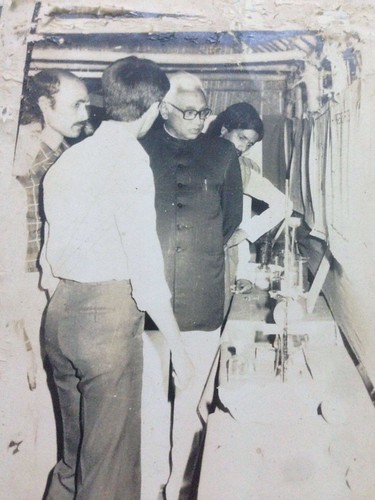By Saba Syed Hafeez for Twocircles.net
Last Wednesday morning, I got the news about the passing away of Kidwai Saheb (Dr A. R. Kidwai).Inna lillahe wa Inna elayhi ra’ajoon (To God we belong and to Him we will return). May Almighty grant him forgiveness and a high place in the heaven.
It is common to see adjectives like academician, chemist, politician, etc., being associated with him. Perhaps a correct way to describe him would be replacing politician with parliamentarian (being member of Rajya Sabha) and administrator. Indeed, he was one the finest administrators of his time whether serving an institution or a state.
Dr. Akhalqur Rehman Kidwai was a one of the few rare personalities bold enough to help fellow Muslims and their community but also to everyone else in general (sounds familiar to all INSAN alumni, a lesson Kidwai saheb and my father got during their schooling in Jamia). Hence, he was dearly respected by everyone regardless of caste or creed; as has been pointed out by others. He was a man of action, he got things done effectively and proactively using his personal achievements and position, without any political rhetoric and noise.

Dr. A. R. Kidwai, then the Governor of Bihar, during a visit to INSAN back in 1982. Here he is visiting a student science exhibition.
During my recent visit to India one employee at the Governor House in Patna recalled when Kidwai Saheb found out that a particular project hadn’t moved because secretariat had not sent the needed data all these months. He ordered the department to open on a Sunday and produce the required data and bring it to his desk that very day. When a small city was about to drown into the communal blood bath, he mobilised the administration to take all preventive steps to stop it during his rule as a Governor of Bihar.
“I am not a politician but I deal with them all the time,” he once told a journalist. His actions drew admirers regardless of party politics. He was appointed to his first post-retirement job as Governor of Bihar by then President Neelam Sanjeeva Reddy of Janata Dal. Today we are also witnessing how he is being remembered by all.
Dr. Kidwai who was educated at Jamia Millia Islamia, later studied at University of Illinois, and Cornell University in the U.S., always had a keen interest in education and science. From leading the nation’s first Biochemistry Department at Aligarh Muslim University, to Union Public Service Commission, Khuda Bakhsh Khan Oriental Library, Alia University, Dr. Ambedkar Center of Bio-medical Research, Gandhian Studies Centers, and to numerous institutions, he left profound marks wherever he served. As a true Gandhian, he also took keen interest in reaching out to the poor, the orphans, the rural farmers, and strived for national harmony.
He could have easily taken his post-retirement gubernatorial and other positions of privilege as relaxing retirement jobs, a common phenomena back in the late seventies, and still so for many. Instead he chose to spend his days as an active, engaging, initiative-taking, and problem-solving public servant.
He was and always will be a role model for all us. Though Kidwai Saheb was four years senior to my father (Dr. Syed Hasan, founder of INSAN, and known as Syed Bhai), he was a great admirer of him and was one of the few people who truly understood my father’s mission and supported it throughout. My father also had great love and respect for him. There was one rare moment when my father got emotional in public right before he was about to welcome Kidwai Saheb to the stage during his visit to INSAN campus. Kidwai Saheb later reflected,”We both took the message of Gandhiji. I headed for cities, Syed Hasan headed for villages. And the villages were the ones Gandhiji emphasised”. This also shows his humility despite his stature.
Many have expressed about his hospitality such as sending his car and chauffeur to picked up his guests. He kept himself always accessible and often people referred to it as his “Khula Darbar”. If there was a genuine request and he could do something about it, he never hesitated in doing that. One time I called, but he was not available. The receptionist at the Haryana Governor House tried to take my information though he seemed to be having difficulty. To my surprise, I received a call back. Whether it was an invitation by a Swami starting a program for orphan kids or the need to help a Tableeghi Jamaat Ijtema’a, he was always ready to offer his contributory hand for the goodness of others, though interestingly he was neither a Hindu nor a Tableeghi.
Just few years back, we wanted to honour Kidwai Saheb. While I was mostly working out the details with his family members, I was told that he wanted to talk to me. He asked me to organize a program in Delhi about INSAN since many people, especially those from the new generation in central government, are unaware of the great works of Syed Saheb and ought to know. He even offered to take care of the venue, guests, and all other logistics. It was such a generous gesture reflecting his approach.
I was fortunate to be able to talk to Kidwai Saheb several times on phone but during my recent visit, I had the opportunity to meet him as well. I was pleased to see him in good spirit but wished I could have done this at least a few years back when I could have collected some memories of the old Jamia days and few words of wisdom.
India has lost another one of her most respected sons and an incredible public servant.
Saba Syed Hafeez is son of late INSAN Founder Padamshree Dr. Syed Hasan, and engaged in hunger, homelessness, and educational causes in America.

